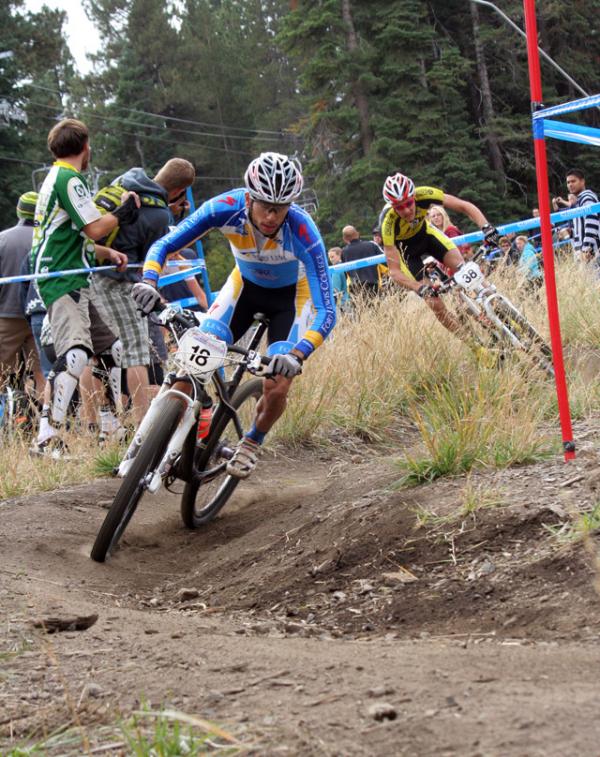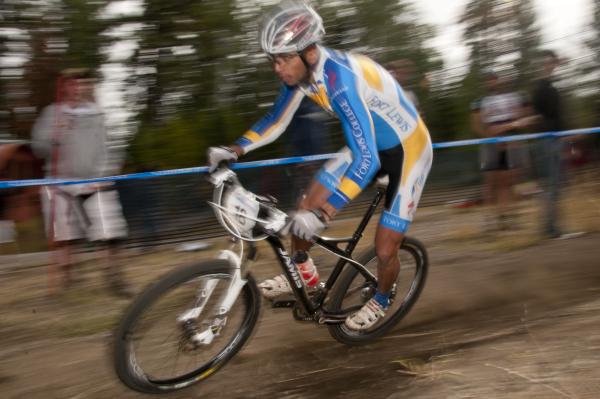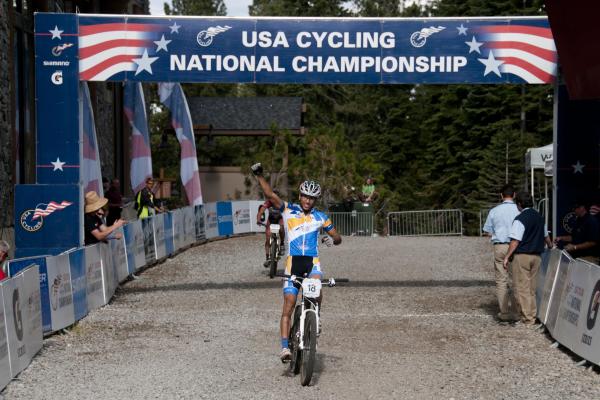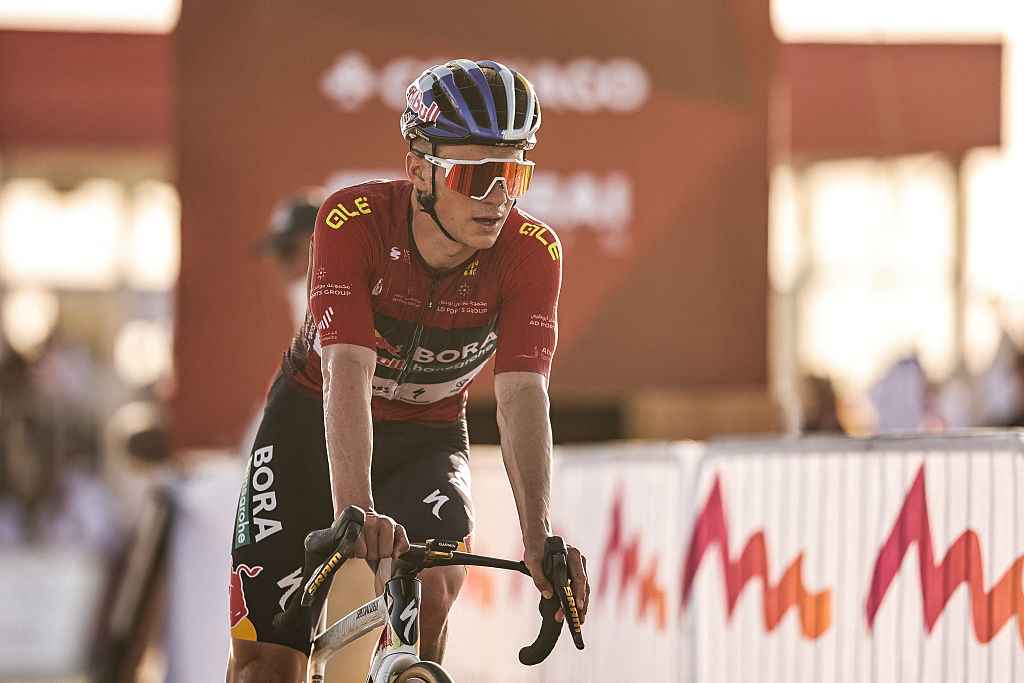Ishay doubles up on nationals success
Collegiate mountain bike champion one to watch
The latest race content, interviews, features, reviews and expert buying guides, direct to your inbox!
You are now subscribed
Your newsletter sign-up was successful



Last month, Rotem Ishay became the first person to win both the US collegiate national cross country and short track championship titles two years in a row. With this accomplishment, Ishay brought an end to what he called an "up and down" season and put his name on the short list of young mountain bikers to watch.
Ishay, who rides for mountain bike powerhouse school Fort Lewis College, isn't a typical college student. The 24-year-old Israeli exercise science major is a junior, with one year remaining until graduation. He also races as a pro mountain biker for Team Jamis and is hoping to make Israel's Olympic mountain bike team.
So far in his cycling career, he has earned eight Israeli national titles including three as a junior and five as an elite racer (Israel does not distinguish separate Under 23 national titles - ed).
As a regular on the pro circuit, Ishay wouldn't have to do collegiate events, but he loves them. "The experience in pro racing is somewhat limited - it depends what team you're on. Most mountain bikers travel to races on their own, but in collegiate, you always go with a team and you race as a team, not as an individual. You might drive eight hours and spend the whole weekend together - it's a totally different experience socially."
"The good thing about collegiate racing is that even if you don't have a good race, you always have a good weekend with your friends. It's about having fun, which is so important for young racers getting into cycling. People say cycling is demanding and costs a lot, but collegiate cycling is also fun, too."
On a mid-October weekend in Northstar-at-Tahoe, California, Ishay applied all of his pro racing skills to help him do the double, winning the two gold collegiate medals.
"I had a lot of pressure on me as the defending champion. The hardest thing for me was calming myself down and not overstress. The fitness was there, and I knew I was healthy." Calming himself with music and meditation and not getting hyped up on coffee were keys to success for Ishay, who said, "Everything came together at race time."
The latest race content, interviews, features, reviews and expert buying guides, direct to your inbox!
From the start of the cross country race that Friday, Ishay and Brad Perlee (Lees McRae) pushed to the front together on the first lap. As a good climber, Ishay felt like he had an advantage on the ascents and strategically bided his time.
"I'm a little lighter and he's a more muscular, high power guy, so I waited a little bit and then coming down to start the second lap, I hit rear wheel really hard on a rock and I cracked my rear carbon rim. The thing about collegiate races is that there are no tech zones. You have to carry everything on your own. Obviously I didn't carry an extra wheel with me. The only thing I could do was keep on riding. I heard it cracking as I rode."
"I took a different strategy then - to go all out on climb to gain as much time as possible so I could relax on the downhill. That was it." His strategy worked, giving him enough of a gap to minimize further catastrophic damage to his rim so that he could ride to victory.
The next day, it was short track time, and the race was set for 30 minutes, longer than a typical pro short track.
"Everyone went really fast from the gun, which you can't really do at altitude, like for this course," he said. "For me, it was obvious people went out too fast too early. I had a good start and let everyone attack me, and I followed wheels until people cracked, and then I attacked them. That happened with about three to four laps to go."
Again racing with guys like Perlee, Ishay knew he had to attack with 100 percent commitment, and he did just that with about three laps to go, then held on for the victory.
Ups and downs
Ishay's 2010 season started well. He went home to Israel in March to do UCI-sanctioned races and collect points to help him toward his Olympic dream. Then back in the US for Sea Otter in April, he said he had an "awful race" on a course that "didn't suit" him.
Fast forward to the European Championships in July. With the venue in Haifa, Italy, the stage was set for a strong performance at home, but it didn't play out that way.
"The Euro champs were a big goal for me. I felt great and everything was in place, but I crashed on the first lap," he said. "I kept on riding, but I tore the lockout remote and then my fork was totally locked and I didn't notice it. I kept on crashing again and again and I didn't know why. I had one really bad one and twisted my handlebar and broke my derailleur. It just took all the wind out of my sails."
"After the race, I remember thinking that races can go so much more badly than you can imagine. I remember saying to myself that I can't wait to see which races will go better than I can imagine."
He only had to wait one week to find out. "I had had bursitis in my knee and couldn't ride for five days and my knee was all swollen, and everyone said, no way I can race Israeli nationals," he said, "but then I kept progressing and the day before, I went to see the doctor again at the Olympic center, and he said most of the swelling is gone, so I can try to race if it's important."
Without even so much as a pre-ride of the course, Ishay went on to win the race. "It was really close until 100m to go. I didn't think I would finish the race after such an intense two weeks. It was extreme going from such a high to a super low and back up again."
Ishay's season had a few other bright spots including at collegiate road nationals where he tied the record for his school for best-ever finish on the road. He was fourth. Ishay said he will try for an even better placing on the road next year at collegiate nationals although he noted how much different racing on tarmac is than off road.
An early start
Unlike many collegiate athletes, who aren't introduced to mountain biking until their college years, Ishay began riding mountain bikes with his dad in Israel at age 9 or 10.
"Dad used to ride a lot, but never raced. We enjoyed our weekends, and he'd take me on long trips. One day, I heard about this mountain bike training camp for kids. I enrolled and didn't know what to expect. I didn't even know there were mountain bike races."
"The instructors for the camp were the elite riders at the time and they saw potential and they told me to start training with the Tel Aviv cycling club in Israel. That first year I won the junior championships and I started racing a little in Europe every summer."
Ishay finished his mandatory national military time and decided he wanted to combine something, like academics, with cycling. "There are no professional teams in Israel, and you can't make a living racing a bike in Israel. I wanted to ride and race my bike and also do something else with my life too. I'm happy with my choice." 2010 marked his second year with Team Jamis.
Approaching the crux
Ishay is closing in on a crucial point in his cycling career. "In order for me to chase my dream of the Olympics, I have to be able to finance myself fully with racing." His days as a full-time student won't go on forever.
In 2011, Ishay will focus on the US Pro XCT series. "This year I missed a lot of them because I was chasing after UCI points, and I was racing more internationally than in the US. I want to improve - I'm looking at consistent top 10 placings and maybe some top five podiums."
The recognition in North America could be just what he needs to pursue his cycling dreams after college. He'll also do the Worlds in Champery, Switzerland, and the two North American World Cups in Windham, New York, and Mont-Sainte-Anne, Quebec, and he'll likely return home for Israeli nationals.
As a non-American attending university in the US, Ishay has struggled to stretch his converted dollars as far as he can. "It's hard with my Israeli currency. Everything is more expensive here."
Long term, he knows it'll be tough to finance his cycling dreams, but he's flexible as to how he does so. "I could be financially independent through either or both racing or exercise science."
"Hopefully next year, I will do so well that I'll get a good (cycling) contract for the year after, and I won't have to worry about having a job right after I graduate. That graduation point will be critical to deciding what I do next - work vs. racing or some combination."
Despite the uncertainty, Ishay is keeping a positive outlook. "All I can do is believe," he said.
If the success of past collegiate national champions is any indication, Ishay is well on the path to his dream. Remember his name - you will probably see it again and again in the coming years.
Sue George is an editor at Cyclingnews. She coordinates all of the site's mountain bike race coverage and assists with the road, 'cross and track coverage.
